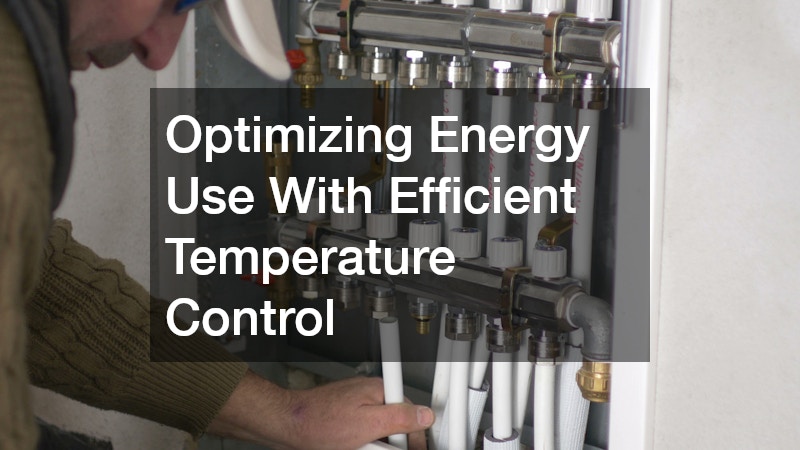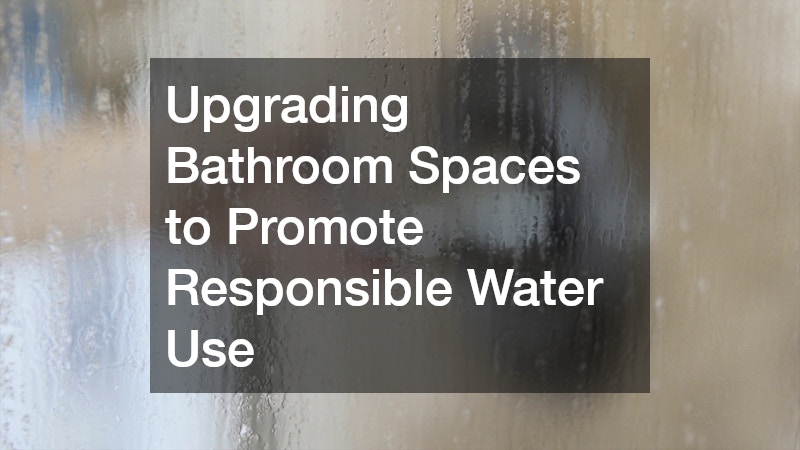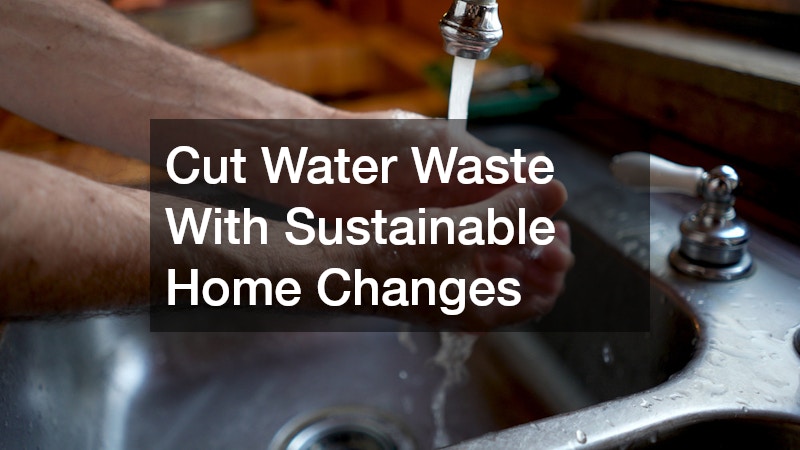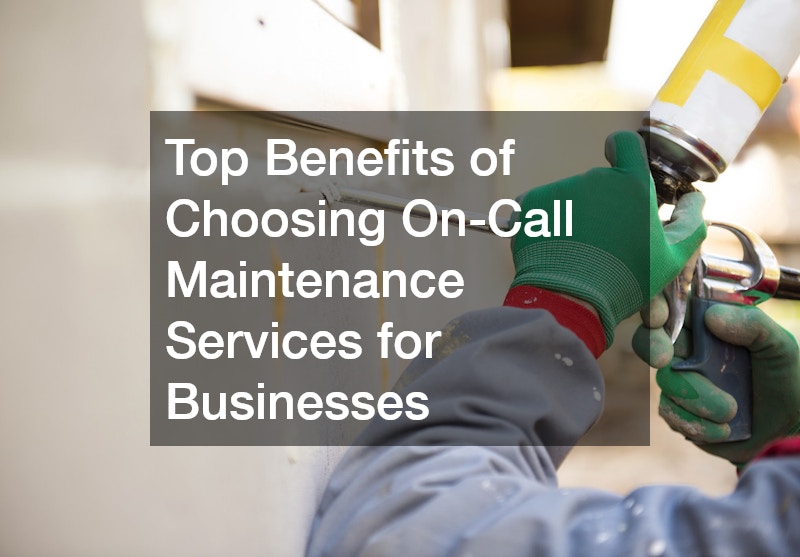Reducing water waste at home is one of the most meaningful steps a household can take toward lowering utility costs, minimizing environmental impact, and creating a more efficient living space. Many homes lose far more water than people realize, whether through unnoticed leaks, outdated fixtures, inefficient appliances, or aging infrastructure. By approaching home maintenance with intention and embracing upgrades that conserve resources, homeowners can support both long-term sustainability and day-to-day comfort. Small adjustments—such as improving energy efficiency, managing moisture more effectively, or optimizing indoor temperature control—can make a cumulative difference and create a healthier environment for the whole household.
More comprehensive improvements, such as upgrading systems, inspecting aging components, or rethinking daily routines, can help ensure that every part of a home operates as efficiently as possible. While some changes require initial planning and effort, the long-term benefits can extend across comfort, cost savings, and environmental stewardship. Sustainable home changes aren’t just about saving water; they’re also about boosting the reliability and resilience of the home overall. With thoughtful habits, regular maintenance, and targeted improvements, homeowners can significantly reduce waste while building a more conscious and efficient living space.
Improving Household Efficiency Through Professional Support

Improving a home’s overall efficiency often begins with understanding how interconnected systems operate. Plumbing, climate control, insulation, and even structural features all play a role in how much water and energy a household consumes. When issues arise, whether visible or hidden, addressing them promptly helps maintain consistent performance across all major home systems. Professional insight can also identify problems homeowners may overlook, such as slow leaks inside walls, worn components, or inefficiencies caused by outdated fixtures. These evaluations contribute to long-term resource savings and help ensure a more environmentally conscious home.
Homeowners seeking targeted guidance often rely on a local plumber to help inspect fixtures, evaluate water pressure, or identify water waste that might otherwise go unnoticed. These professionals can provide detailed assessments of older piping, recommend fixture upgrades that reduce unnecessary consumption, and diagnose inefficiencies that may develop gradually over time. Through routine visits or occasional inspections, they can help homeowners create a more efficient household environment that reduces waste while maintaining comfort.
Maintaining Reliable Water Access With Routine System Care
Homes that depend on private water sources require careful oversight to keep their systems functioning reliably. Water delivery components must operate smoothly to provide the pressure and volume needed for everyday tasks like bathing, cooking, and cleaning. Regular maintenance prevents costly disruptions and supports a more sustainable water system by reducing the risk of leaks, overuse, and mechanical strain. Keeping equipment in good condition also helps preserve water quality and ensures that the supply remains dependable during periods of increased household demand.
For many households, scheduling periodic well pump services helps maintain performance and prevent unexpected failures. These services typically include checking pressure controls, inspecting pump motors, testing water levels, and confirming that the system is working efficiently. By addressing minor issues early, homeowners reduce the chances of wasteful overcycling, inconsistent pressure, or system strain that leads to premature breakdowns. With proper upkeep, water access remains steady, efficient, and environmentally responsible.
Reducing Water Waste Through Skilled Home Maintenance

Just as homeowners rely on regular inspections for heating or electrical systems, plumbing maintenance plays a crucial role in preventing household water waste. Pipe connections, fixture seals, and aging appliances often develop small problems over time that gradually affect efficiency. Many of these issues remain hidden until they cause noticeable damage, yet they may have already been wasting water for months or years. Routine care helps identify inefficiencies early and supports the home’s overall sustainability goals. Good maintenance not only reduces waste but also helps extend the lifespan of major systems.
When issues require specialized skill, professional plumbers can offer solutions that improve both function and efficiency. They can pinpoint leaks behind walls, detect pressure irregularities, repair faulty valves, or recommend targeted fixture upgrades that reduce unnecessary water use. Their expertise allows them to address underlying causes rather than just visible symptoms. By conducting thorough system checks and fine-tuning water distribution, they help homeowners maintain a well-functioning household that uses resources responsibly.
Enhancing Home Comfort With Smarter Climate Management
A comfortable indoor environment relies on more than just temperature—humidity, airflow, and energy efficiency all contribute to how a home feels and performs. Climate control systems influence not only comfort but also water use in ways homeowners might not expect. For example, excess humidity can increase condensation, strain appliances, and contribute to mold growth, indirectly affecting how frequently plumbing systems are used. A well-managed indoor climate supports both comfort and sustainability by reducing stress on multiple household systems.
Improvements to air conditioning systems can contribute to better water conservation indirectly by helping maintain stable indoor humidity levels. When these systems operate efficiently, they remove excess moisture, reduce reliance on dehumidifiers, and create a more balanced home environment. Routine maintenance—such as cleaning coils, changing filters, and ensuring proper airflow—also reduces energy waste and supports the home’s broader sustainability efforts. Improving climate management benefits multiple interconnected systems while helping homeowners maintain efficient daily routines.
Optimizing Energy Use With Efficient Temperature Control

Temperature regulation plays a foundational role in a home’s overall energy efficiency and water usage. Maintaining consistent indoor temperatures can reduce moisture fluctuations, prevent condensation issues, and lessen the strain on insulation and ventilation systems. When household temperatures swing too widely, plumbing components may expand or contract more frequently, increasing wear and tear over time. Efficient temperature control therefore contributes indirectly to more sustainable water management.
Homeowners who pay attention to their heating systems by performing routine maintenance, scheduling inspections, and upgrading outdated components help create a more efficient indoor environment. Well-maintained systems deliver consistent warmth without overusing energy, and improved temperature stability supports the broader efficiency of connected household systems. By optimizing temperature control, homeowners can reduce unnecessary strain and support responsible resource use throughout the home.
Protecting Water Resources Through Proper Waste Management
Waste management systems play a significant role in maintaining the overall efficiency of a home’s water use. When these systems are neglected, they may become overloaded, leading to backups, contamination risks, and excessive water consumption. Regular maintenance ensures that wastewater moves through the system properly and does not cause strain on plumbing fixtures or surrounding soil. Managing waste responsibly supports both environmental health and the long-term performance of the home’s water systems.
Scheduling routine septic tank pumping helps prevent excessive buildup, ensuring that wastewater flows smoothly through the system. When tanks are maintained properly, homeowners reduce the risk of overflow, clogs, and costly repairs that often result from neglect. Keeping waste systems in good working condition also minimizes the risk of groundwater contamination and supports responsible water management practices at home.
Upgrading Bathroom Spaces to Promote Responsible Water Use

Bathroom upgrades offer some of the most effective ways to reduce water consumption while also increasing comfort and functionality. Modern fixtures and thoughtful design choices can help control water flow, reduce splashing, minimize heat loss, and optimize water usage during daily routines. Even small adjustments, such as adjusting shower timing, installing aerators, or updating drains, can enhance a home’s water conservation efforts and improve overall efficiency. By approaching bathroom design with both sustainability and usability in mind, homeowners can create spaces that are more comfortable and environmentally responsible.
A well-designed glass shower enclosure can help contain moisture, reduce drafts, and provide a more controlled environment for efficient bathing. These enclosures help maintain water temperature more effectively and limit the amount of water that escapes the shower area. By creating a sealed space, they also reduce the need for longer showers by keeping warmth in, indirectly supporting water conservation. In addition, combining a glass enclosure with other water-saving upgrades, such as low-flow showerheads or timed faucets, further maximizes efficiency and minimizes unnecessary water use. Together, these improvements contribute to a sustainable, functional, and comfortable bathroom environment.
Designing Safer Bathing Areas With Water-Saving Features
Creating a bathroom that balances safety, comfort, and sustainability requires thoughtful design and effective layout planning. Features that improve accessibility can also support more responsible water use by helping individuals complete daily routines more efficiently. Accessible spaces ensure that everyone in the household can maintain comfort and independence while minimizing strain on plumbing systems. Additionally, well-planned bathrooms can improve ventilation, reduce moisture buildup, and prevent water-related damage, all of which contribute to a longer-lasting, more efficient space.
Installing an accessible shower can help create an environment that encourages both safety and water efficiency. These designs often incorporate low-threshold entries, strategically placed seating, and streamlined layouts that reduce unnecessary water exposure. Because they are built for ease of use, accessible designs can also help minimize water waste by supporting more controlled and consistent bathing routines. Many accessible showers also integrate water-saving fixtures, such as low-flow showerheads or timed faucets, which further enhance efficiency while promoting comfort. These improvements benefit both household safety and long-term sustainability, making them a valuable addition to any home.
Extending System Lifespan With Preventive Equipment Maintenance
Preventive maintenance is a core component of keeping household systems functioning at peak efficiency. When equipment is serviced regularly, components last longer and consume fewer resources. Maintenance ensures that systems operate at the correct pressure, temperature, and flow levels, helping prevent water waste caused by malfunctioning parts. A proactive approach also reduces the risk of sudden failures that can lead to excessive water use or significant property damage. Regular checkups also give homeowners a clearer understanding of how their systems are aging, making it easier to plan upgrades or repairs before issues become disruptive.
Many households rely on water pump services to maintain proper system performance and keep daily routines running smoothly. These services include inspections, pressure checks, and adjustments that help the pump operate efficiently without overworking. By ensuring that equipment is not drawing more power or water than necessary, preventive maintenance supports responsible resource use and contributes to the home’s overall sustainability strategy. These visits also allow technicians to identify early signs of wear, recommend small repairs, and help homeowners avoid the high costs associated with emergency breakdowns.
Preserving Water Quality Through Timely Equipment Repairs
Keeping water delivery systems in good condition is essential for maintaining both water quality and efficient operation. When components wear out or malfunction, they often cause the system to work harder, leading to unnecessary water and energy consumption. Timely repairs address issues quickly, preventing waste and helping ensure that every part of the system operates smoothly. Addressing problems early also helps extend system lifespan and protect water quality at the source. In many cases, routine assessments can uncover gradual declines in performance that homeowners might not notice, allowing issues to be corrected before they affect the entire household.
Homeowners who schedule prompt water well pump repairs can avoid long-term inefficiencies and maintain a steady, reliable water supply. These repairs may include fixing pressure issues, replacing worn seals, or addressing electrical components that affect pump performance. Quick action helps prevent a small issue from escalating into significant water waste or costly system failures. By ensuring the pump operates within proper parameters, homeowners reduce strain on surrounding systems and preserve water integrity. Through timely repairs, homeowners support both system health and environmental responsibility while contributing to the long-term sustainability of their home’s water supply.
Creating a sustainable home requires a combination of routine maintenance, thoughtful upgrades, and ongoing awareness of how daily habits influence resource use. Water efficiency connects to nearly every part of the home—from climate control to waste management to the condition of essential systems. By making mindful adjustments and caring for each component with long-term performance in mind, homeowners can reduce waste and improve overall efficiency without sacrificing comfort. Many of these improvements also enhance system reliability, promote a healthier living environment, and help extend the lifespan of important household infrastructure.
Sustainability is achieved through steady, manageable changes rather than dramatic overhauls. Whether homeowners focus on upgrading fixtures, maintaining vital systems, or improving indoor comfort, each step contributes to a more efficient and environmentally conscious household. By understanding how interconnected these systems are, homeowners can take meaningful actions that conserve valuable resources, support long-term cost savings, and create a more resilient and responsible home.


